Mistakes—I hate making them. Sins—I hate committing them. Trials—I don’t like having them. Temptations—I don’t like facing them. One would think that given how much I don’t like these things, I could just avoid them. Wrong.
Experiencing all of this is part of what make us human. The Bible tells us that in His lifetime Jesus faced these trials and temptations.
For we do not have a high priest who is unable to sympathize with our weaknesses, but we have one who has been tempted in every way, just as we are– yet was without sin (Hebrews 4:15) .
How did He do that?
Aside from having a holy understanding of how God sees trials, Jesus also knew what happened to people in the history of Israel. He knew the mistakes others had made, going all the way back to Adam. By His trust in God, Jesus was able to avoid the errors of those in the past.
Today’s passage, 1 Corinthians 10:1-18 gives some stark examples from Israel’s history—undoubtedly a history with which Jesus was familiar. And before the Apostle Paul penned the words by the Spirit of Christ, Jesus knew them.
These things happened to them as examples and were written down as warnings for us, on whom the fulfillment of the ages has come. So, if you think you are standing firm, be careful that you don’t fall! No temptation has seized you except what is common to man. And God is faithful; he will not let you be tempted beyond what you can bear. But when you are tempted, he will also provide a way out so that you can stand up under it (1 Cor 10:11-13).
 This is reassuring news. We don’t need to learn from our own mistakes. We can learn from other people’s. Seeing the consequences beforehand, we don’t have to resort to trial and error as a way of moving through the obstacle course of life. We can watch those ahead of us in line.
This is reassuring news. We don’t need to learn from our own mistakes. We can learn from other people’s. Seeing the consequences beforehand, we don’t have to resort to trial and error as a way of moving through the obstacle course of life. We can watch those ahead of us in line.
We can keep an eye to the past and either learn from it or repeat it. But we cannot assume our consequences will be any different for any course of action. Therefore, it’s a better thing to keep our eyes focused on how Jesus lived and look with faith toward the one who will provide a way out of the temptation so we can finish the race without falling.
With so many examples of people from history, let’s learn from Jesus’ wisdom and from other people’s mistakes. It’s much better than trial and error.
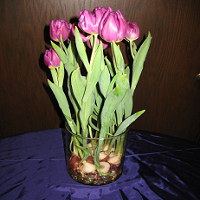 I think there’s something of the splendor of God in every emerging sprout, the jiggle of the earthworm, and the singing of the cardinals. I love spring.
I think there’s something of the splendor of God in every emerging sprout, the jiggle of the earthworm, and the singing of the cardinals. I love spring.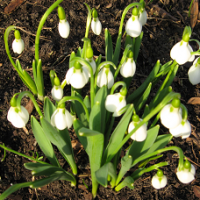 The snow isn’t completely gone from my yard, but my early spring bulbs (which are late this year because of snow cover) are coming up. Snow crocus, snowdrops, winter aconite are among my favorites for cheering the heart. Soon, the chinodoxa and daffodils will be blooming in warmer microclimates in my yard. Not all the daffodils will flower outside though–some will come indoors to bloom.
The snow isn’t completely gone from my yard, but my early spring bulbs (which are late this year because of snow cover) are coming up. Snow crocus, snowdrops, winter aconite are among my favorites for cheering the heart. Soon, the chinodoxa and daffodils will be blooming in warmer microclimates in my yard. Not all the daffodils will flower outside though–some will come indoors to bloom. Today we begin exploring ways to walk on the Way of Holiness.
Today we begin exploring ways to walk on the Way of Holiness.  When we travel somewhere, we carefully pack our suitcases. We assemble our supplies in a tiny plastic bag so we can make it through airport security. We take action well before our journey to ensure we will get on the plane with our carry-ons. We have our destination in mind.
When we travel somewhere, we carefully pack our suitcases. We assemble our supplies in a tiny plastic bag so we can make it through airport security. We take action well before our journey to ensure we will get on the plane with our carry-ons. We have our destination in mind. 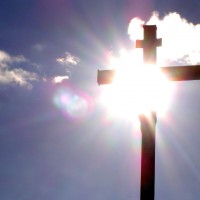 Hezekiah associated sin with its consequences (v 7). Contrasted with the Westboro so-called Baptist Church, Hezekiah didn’t command hate speech, picketing, or hurting others to throw sin’s blame on someone else. Rather, everyone sought God, recognizing there is collective and individual responsibility for sin.
Hezekiah associated sin with its consequences (v 7). Contrasted with the Westboro so-called Baptist Church, Hezekiah didn’t command hate speech, picketing, or hurting others to throw sin’s blame on someone else. Rather, everyone sought God, recognizing there is collective and individual responsibility for sin.  A central theme of Deuteronomy is encouragement to remember and not to forget. While that might seem like the same encouragement coming and going, there is an important distinction which we see in Chapter 8. In Deut 8:2, Israel was to remember that God faithfully led them in the desert for 40 years; their clothes never wore out; neither did their sandals; they had food to eat; and water to drink. Day after day for 40 years God was faithful. Every day for 40 years, God ensured they would have no doubt His hand had delivered them. He was continually delivering them. Forty years… the full lifetime of everyone under the age of 40! God had proven His faithfulness every day of their lives. This was grace in the desert.
A central theme of Deuteronomy is encouragement to remember and not to forget. While that might seem like the same encouragement coming and going, there is an important distinction which we see in Chapter 8. In Deut 8:2, Israel was to remember that God faithfully led them in the desert for 40 years; their clothes never wore out; neither did their sandals; they had food to eat; and water to drink. Day after day for 40 years God was faithful. Every day for 40 years, God ensured they would have no doubt His hand had delivered them. He was continually delivering them. Forty years… the full lifetime of everyone under the age of 40! God had proven His faithfulness every day of their lives. This was grace in the desert.
 The closer we get to God, the more we see ourselves in our sinful state. In Exodus 19 and 20, Israel was told to be prepared to meet their God. They had prior warning (Exodus 19:9). Couldn’t they have been totally prepared? They had two days to wash their clothes—and they did. They set up barricades to keep themselves from touching the mountain in Sinai’s desert. Done. Check!
The closer we get to God, the more we see ourselves in our sinful state. In Exodus 19 and 20, Israel was told to be prepared to meet their God. They had prior warning (Exodus 19:9). Couldn’t they have been totally prepared? They had two days to wash their clothes—and they did. They set up barricades to keep themselves from touching the mountain in Sinai’s desert. Done. Check!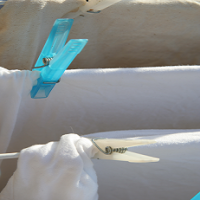 Moses was one of them. By comparison with an equal, they weren’t quite so afraid…or appalled at how sinful they were. Have you ever had a white shirt that once you wore it, no matter how effective the laundry method, strong the detergent, how much bleach you used, that shirt was never brilliant white again? Hanging amongst many not-so-white-anymore shirts, one shirt doesn’t look so bad, but buy a new one, hang it on a hanger, and all the old shirts dim by comparison.
Moses was one of them. By comparison with an equal, they weren’t quite so afraid…or appalled at how sinful they were. Have you ever had a white shirt that once you wore it, no matter how effective the laundry method, strong the detergent, how much bleach you used, that shirt was never brilliant white again? Hanging amongst many not-so-white-anymore shirts, one shirt doesn’t look so bad, but buy a new one, hang it on a hanger, and all the old shirts dim by comparison. If the Bible were to have a “Best Of” series of Hall of Fame moments, it might be about the desert and recount times when the nation of Israel had seen God at work in powerful ways! In many respects, today’s passage (
If the Bible were to have a “Best Of” series of Hall of Fame moments, it might be about the desert and recount times when the nation of Israel had seen God at work in powerful ways! In many respects, today’s passage ( 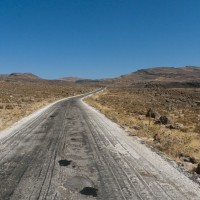 Who are you and what are you doing?
Who are you and what are you doing?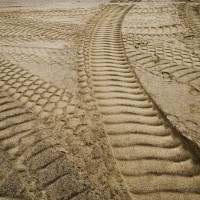 As we prepare the way for the Lord during Lent, let’s ask ourselves:
As we prepare the way for the Lord during Lent, let’s ask ourselves: